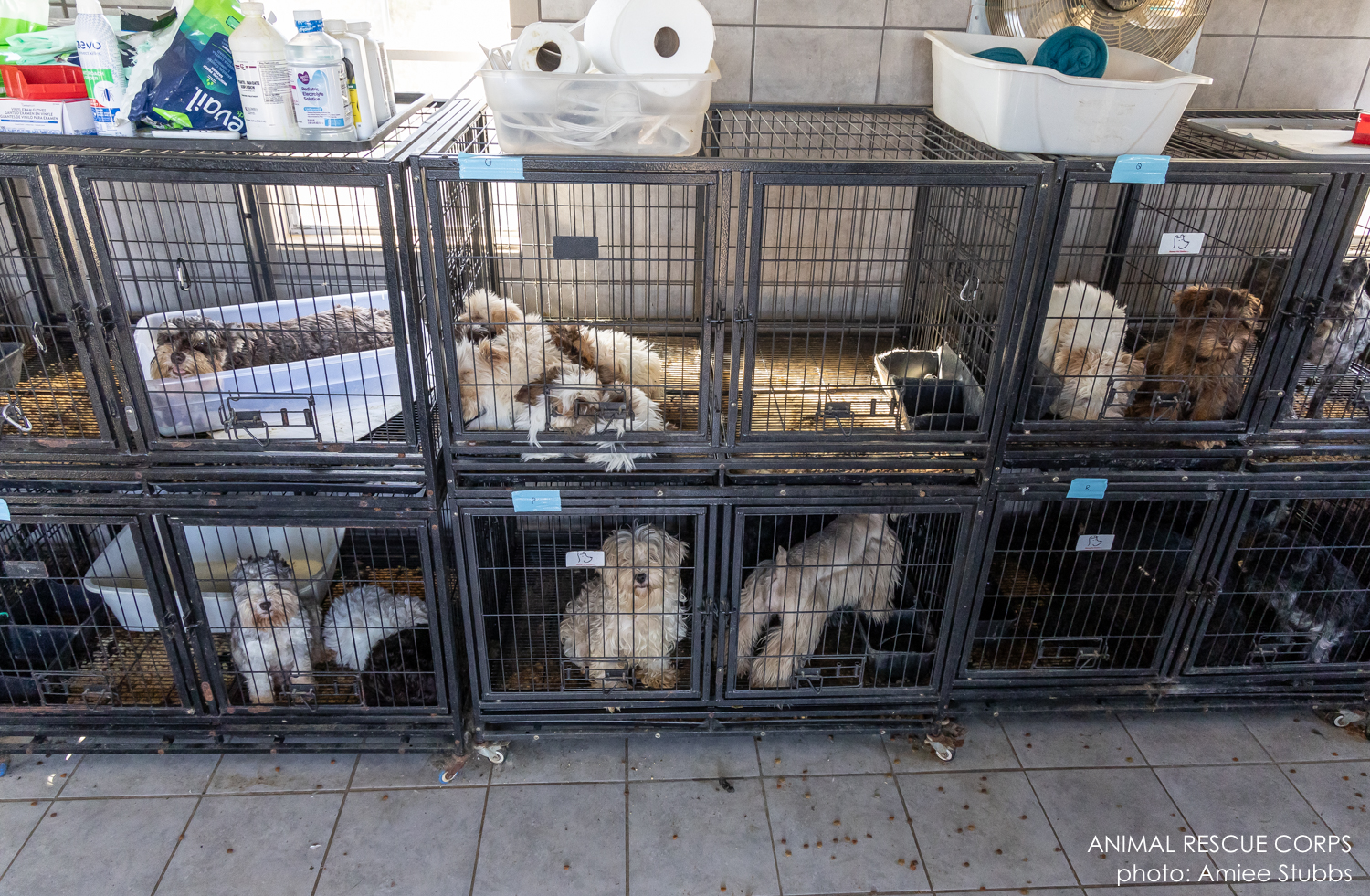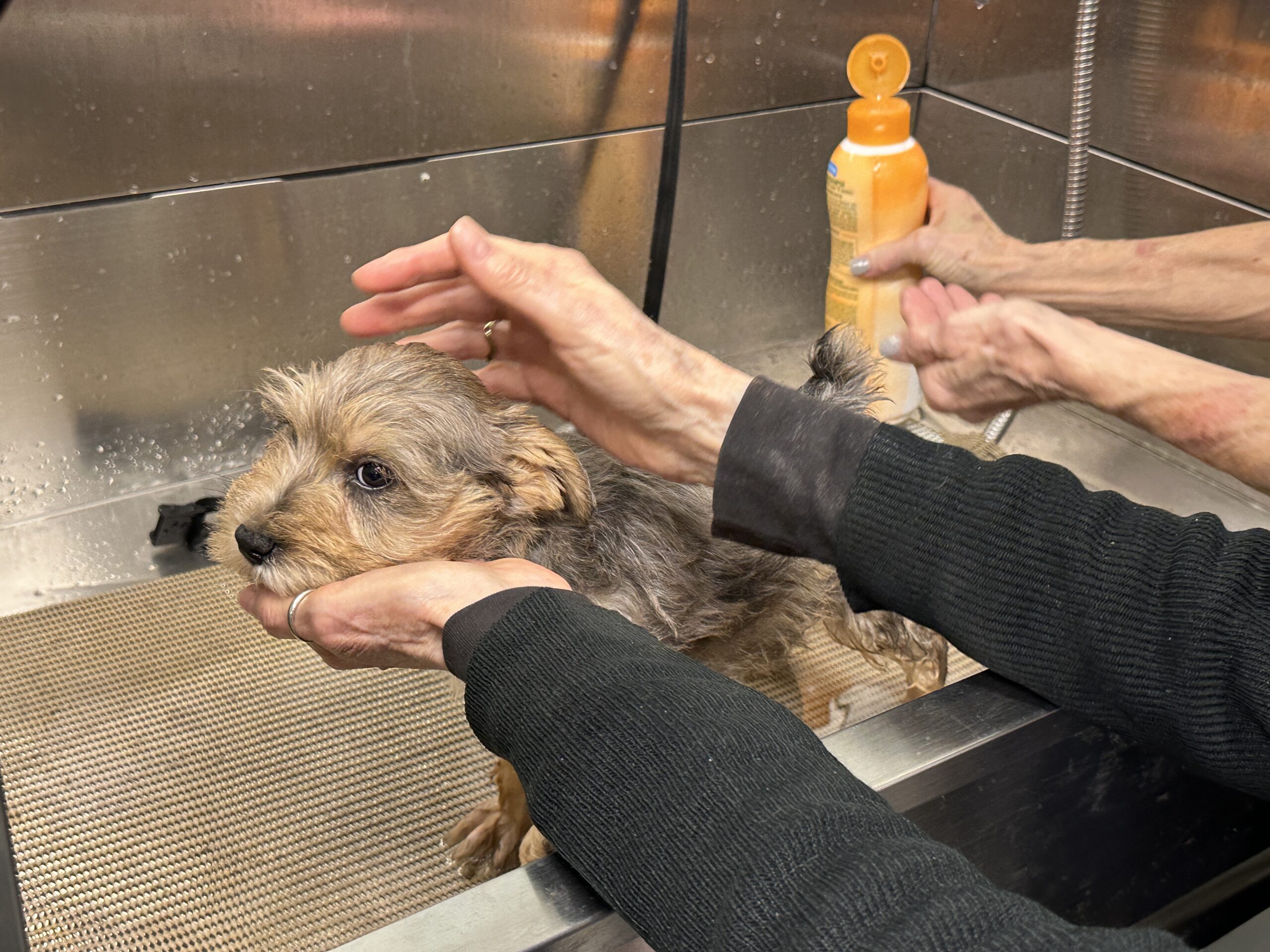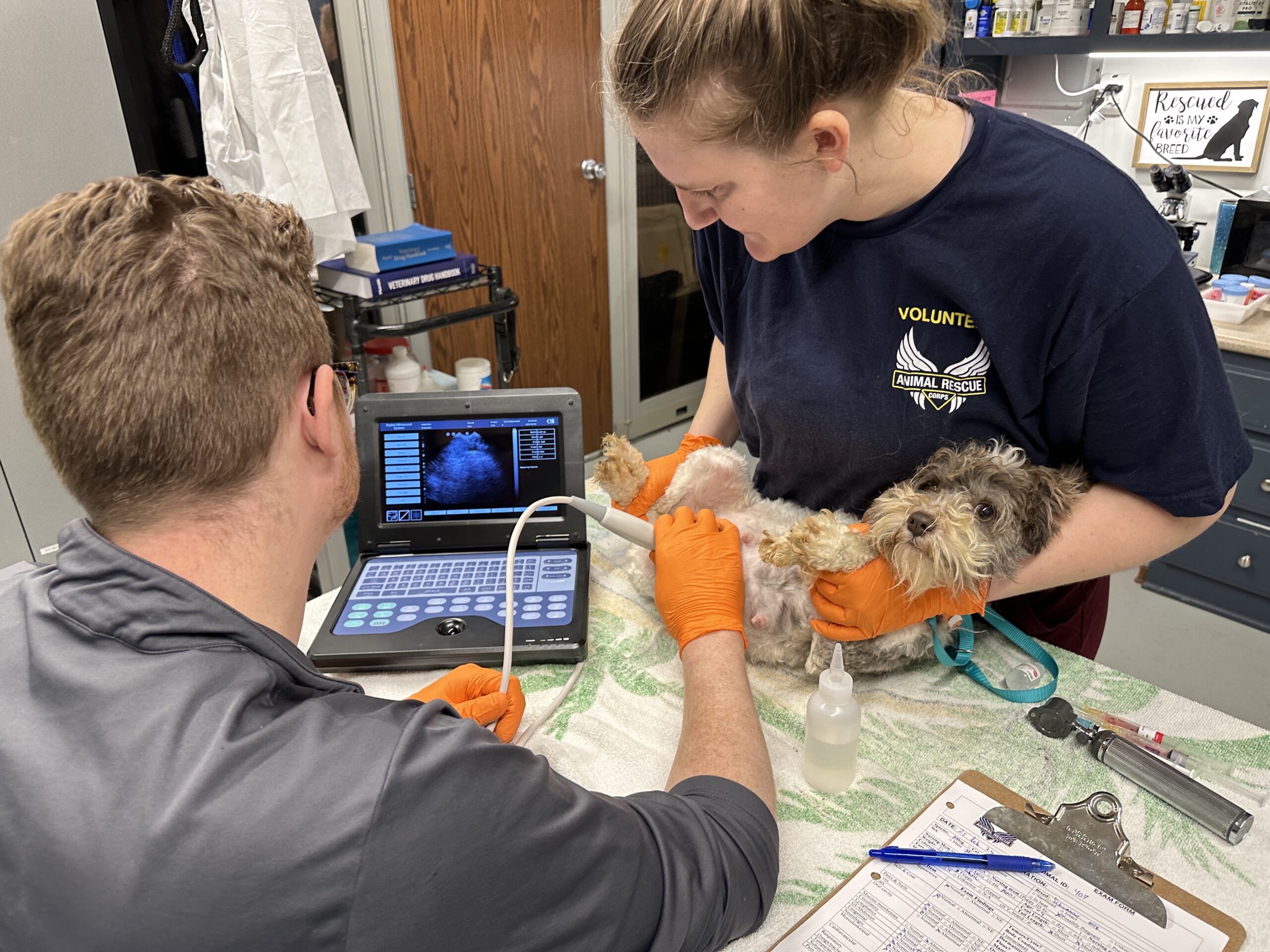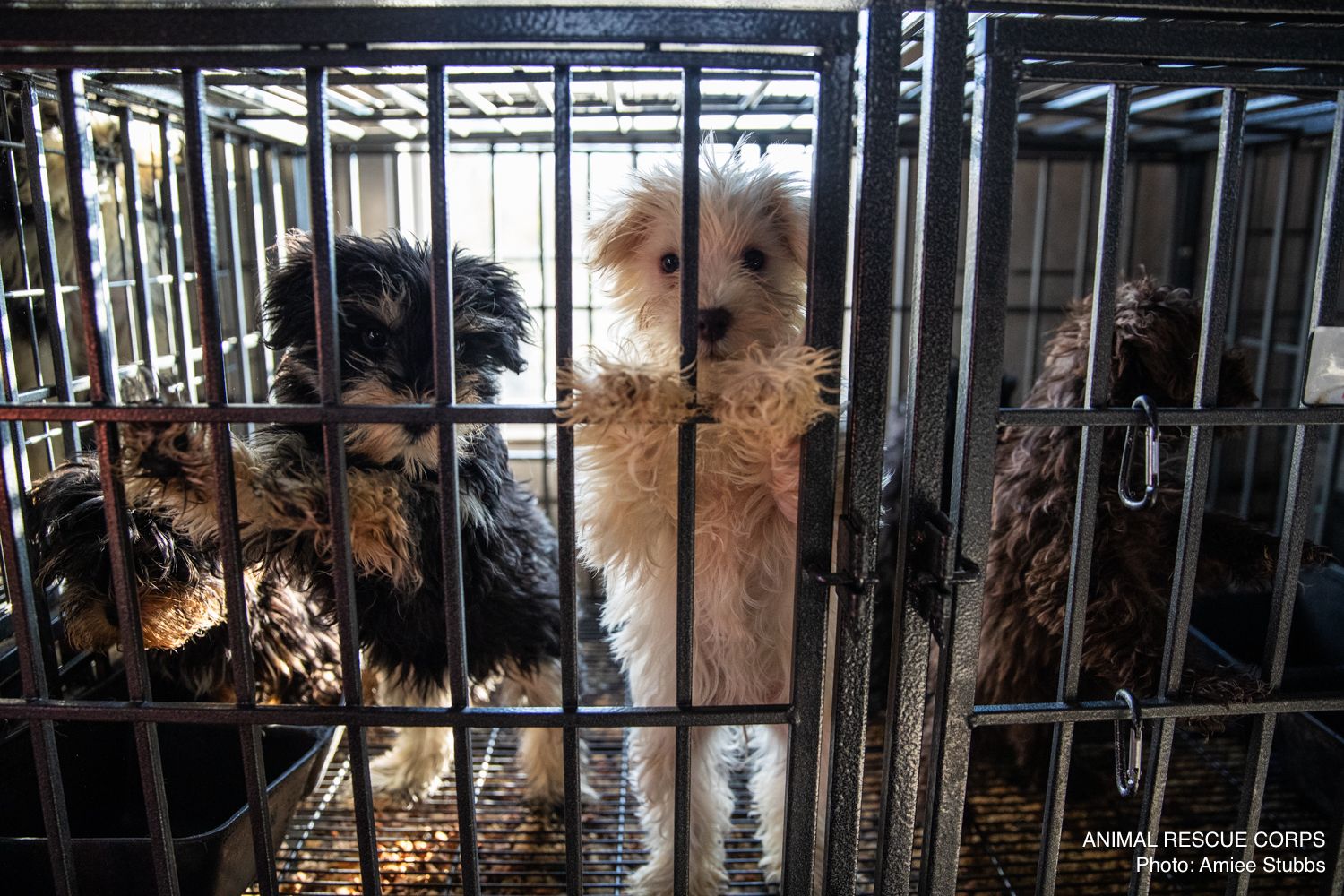After Chatham County authorities seized more than 200 dogs as part of an animal cruelty investigation and charged their owners a month ago, attention quickly turned to the next steps for the dogs.
Now, after some rehabilitation and advancing legal repercussions, dozens of dogs are officially going to be up for adoption — largely thanks to national groups that stepped in to help.
The Chatham County Sheriff’s Office began investigating after a community member called in late January about “distressing sounds” of dogs heard on the property about seven minutes southwest of Siler City. The case led them to two people and multiple buildings on site where dogs were kept in an alleged puppy mill.
Recognizing the scale of the operation, the sheriff’s office turned to third parties.

Some of the dogs and conditions they were kept in at 1360 Oakley Church Road in Chatham County. Two women, Kelly Dawn Privat and Alicia Culberson, were charged with animal cruelty. (Photo via Aimee Stubbs/Animal Rescue Corps.)
“Law enforcement agencies don’t need someone to come in and take over, they just need some support,” says Kim Alboum, the Director of Field Operations for the BISSELL Pet Foundation.
BISSELL is a national organization that works to connect groups to resources when completing an animal rescue. It works to facilitate whatever responses authorities need for any animal rescue circumstance.
“They might need help just creating a warrant because it’s not a large number of animals and maybe they haven’t done an animal cruelty case before,” says Alboum. “Or maybe they need help to not only execute the warrant but to gather evidence and do the forensics on site. So, it really just depends on what is needed, but we have a resource for just about everything.”
Alboum, who is a Pittsboro resident, says the scale of the dog seizure in Bear Creek is uncommon but not unusual for BISSELL. She helped coordinate on-site when the law enforcement returned with warrants to begin taking dogs away, and she says it can be challenging to keep emotions in check during the seizures.
“It is just really shocking how greedy some people can be with these sentient beings,” says Alboum. “They don’t care about the health and welfare of the animals, and so you find animals in extreme cases of neglect – varying levels, but many of them were extreme. It’s heartbreaking. And your first impulse is, ‘my God, I’ve got to get these animals out of here.’ And of course, there’s a process [to do so].”
One of BISSELL’s national partners is Animal Rescue Corps, which helps with the seizure, sheltering, and grooming of animals after the warrants have been delivered. Michael Cunningham is a shelter director for the organization and animal handler in the field, who was also on-site for the Chatham County case. Cunningham said adrenaline usually kicks in to help him focus up as they get animals out of bad situations before he processes the trauma later.
“There were 214 live animals,” he said of the Bear Creek property. “Since they’ve been in our care, we’ve had three puppies born here at our facility, so our numbers have gone up. They are schnauzer and schnauzer mixes – both miniature, standard, and giant schnauzers. And there [were] two Doberman pinschers on the property as well, and we have them here.”

Michael Cunningham, the lead animal handler for Animal Rescue Corps, holds a dog during the seizure of animals in Chatham County. (Photo via Aimee Stubbs/Animal Rescue Corps.)
Cunningham said the dogs were in three different buildings at the alleged puppy mill, which all had their windows and doors shut. He said it had a characteristic common to other rescues: a smell strong enough when his team entered that their eyes watered and skin burned.
“As urine and feces break down, it gives off ammonia gas,” Cunningham explained. “And that gas concentrates in the air inside of these buildings. Anything ver 25 parts per million, you should be wearing a respirator or something to protect your lungs. And these buildings were over 200 parts per million.
“You can tell they were just desperate,” he said of the dogs inside. “That’s the word that keeps coming to my mind as I went into these buildings: they just seemed desperate.”
Since their removal from Bear Creek, the dogs have been sheltered at an Animal Rescue Corps facility in Nashville, TN. Cunningham said while there, they get extensive veterinary treatment: check-ups, baths, shaving of matted fur, pregnancy checks and exposure to clean air. They also begin a slow adjustment socially, as they have more individual time and space.

A rescued dog from Bear Creek receives a bath from Animal Rescue Corps workers. According to the organization, its workers have spent more than 5,000 total hours caring for the dogs seized from the alleged puppy mill. (Photo via Animal Rescue Corps.)

One of the rescued dogs from Bear Creek is given an ultrasound to look for puppies at the Animal Rescue Corps facility. (Photo via Animal Rescue Corps.)
Cunningham said one of the women charged with animal cruelty surrendered control of her dogs as part of the legal proceedings, which means 85 of the dogs can now be sent to shelter partners across the U.S. to find new homes. Some will head to Chicago and Virginia Beach, according to Cunningham. But community members could also have a chance to adopt them from in-state shelters, as others will be taken to Pawfect Match in Holly Springs and the Forsyth Humane Society in Winston-Salem.
Cunningham said if people do seek out these specific dogs – or any others rescued from rough environments – always be wary of the changes they’re experiencing. He said while it’s inspiring to see dogs look at the sky or process a new home for the first time, the animals often face big adjustments and may work better in places where another dog can set the example.
“The whole world is new to them,” said Cunningham. “They don’t know how to walk on grass, they don’t know how to walk on shiny floors, they don’t know what stairs are. Some of the things we take for granted from animals, all of these things are completely new to these [rescues]. It takes a little bit of patience.”
Alboum urges people to adopt instead of seeking certain types of animals from breeders. But if people do want to go that route, she says there are signs to watch for if animals are being treated poorly.
“If you’re going to purchase an animal and you walk into what you thought was a good breeder,” says Alboum, “and the dogs are not in good condition, there’s a high ammonia level, the dogs don’t look happy, they don’t look comfortable, you’re not allowed to see certain animals… red flag, red flag, red flag. If it doesn’t feel right, walk away, don’t give that person your money, and report them.”
Chapelboro.com does not charge subscription fees, and you can directly support our efforts in local journalism here. Want more of what you see on Chapelboro? Let us bring free local news and community information to you by signing up for our newsletter.











